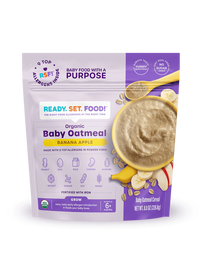Landmark studies and recent clinical guidelines have shown how vital it is to introduce peanut to babies in their first year of life. Pediatricians have a significant influence on whether parents introduce peanuts early, but some pediatricians aren’t following the guidelines.
Dr. Erika Nolte, our Science Director, talks about the importance of raising awareness of allergen introduction guidelines among pediatricians, so pediatricians can share these guidelines with parents.
Within the realm of childhood food allergies, notably peanut allergies, a shifting landscape of guidance has emerged. Initially, the American Academy of Pediatrics (AAP) took a cautious stance, advising the delay of peanut introduction until a child reached three years of age. This approach developed in response to the surging prevalence of pediatric food allergies. However, a seismic shift occurred with the unveiling of the Learning Early About Peanut Allergy (LEAP) trial in 2015. A pivotal revelation emerged: introducing peanut products between 4 to 11 months led to an astonishing 81% reduction in peanut allergies among infants.
This new evidence spurred the National Institute of Allergy and Infectious Diseases (NIAID) to revise their guidelines in 2017, championing early peanut introduction as a preventive measure for high-risk infants – a stance now endorsed by the AAP.
Across the span of January to February 2021, the Center for Food Allergy and Asthma Research conducted a national survey. This survey reached out to parents and caregivers of children aged 7 months to 3.5 years, probing into their patterns of peanut consumption, familiarity with guidelines, comprehension of recommendations, personal convictions, caregiving methodologies, and demographic particulars.
Pediatricians’ guidance significantly impacts whether parents introduce peanut
The role of pediatricians and primary care doctors emerged as a significant influence on parents' decisions about when to introduce allergens. Pediatricians who recommended guideline-compliant peanut introduction had a notable impact on parents' choices, fostering adherence to the guidelines.
However, less than two-thirds of parents (57.8%) reported that their pediatrician had talked to them about allergen introduction.
And out of that group, nearly three-quarters said that their pediatrician did not bring up early allergen introduction until after 6 months, missing the recommended 4-to-6-month window. That means that only about 15% of parents got information on early allergen introduction from their pediatrician before their baby was 6 months old.
Some pediatricians’ advice was not consistent with guidelines
Further, of parents whose pediatrician talked to them about feeding peanuts, over a third (37.8%) recommended delaying peanuts until after their baby was 12 months old. This advice was not in compliance with what research and guidelines show are the best practices for preventing food allergies.
Overall, this data suggests that there is significant room for improvement in how pediatricians communicate about early allergen introduction to new parents.
Following the recent guidelines is key to a healthier future for babies
Recent data has shown that for babies at high risk of developing a food allergy, earlier introduction is better. After the baby is 3 months old, every month delay in feeding peanuts results in about a 30% increase in the risk of a peanut allergy. If pediatricians are not talking to parents until after babies are six months old, parents are missing a crucial window for allergen introduction.
Ready. Set. Food!: Raising awareness of allergen introduction guidelines among pediatricians
Ready. Set. Food! has worked with many healthcare systems to integrate educational material about early allergen introduction directly into the electronic medical records used by pediatricians. This prompts clinicians to talk to parents about early allergen introduction and provides direct information to parents at the 2-month, 4-month, and 6-month well baby visit. We hope this will help empower physicians to talk to parents about early allergen introduction in a timely manner. By providing parents with direct and automatic access to educational materials, we can ensure that they are getting all of the information to help their baby have the best chance at an allergy-free future.
Ready. Set. Food! is also helping to improve healthcare education with our continuing medical education (CME) courses at Memorial Hermann Health Center. These courses feature leading allergy experts, summarize the latest medical guidelines on food allergy prevention, and show how the Ready. Set. Food! system can make it easier for families to follow the latest guidelines. This way, providers are more equipped to teach families about the importance of early allergen introduction.
-------------------------------
All health-related content on this website is for informational purposes only and does not create a doctor-patient relationship. Always seek the advice of your own pediatrician in connection with any questions regarding your baby’s health.
These statements have not been evaluated by the Food and Drug Administration. Products are not intended to diagnose, treat, cure or prevent any disease.
See the FDA Peanut Allergy Qualified Health Claim at the bottom of our homepage.

New Study Shows That Infant Anaphylaxis Usually Resolves With One Epinephrine Dose
A recent study has shown that, when infants experience severe aller...

Pregnancy Nutrition: What To Eat In The First Trimester
What to eat in the first trimester that will nourish your body, pro...

Formula Feeding Amounts: How Much Formula Should You Feed Baby Per Day?
How much formula should baby drink per day? It depends on their age...

What Baby Eats In A Day: 6-12 Months Old
Looking for ideas of what to feed your 6-12 month old little one? H...

What To Look For When Choosing An Early Allergen Introduction Solution
Medical guidelines recommend early allergen introduction – the earl...

Why are food allergies on the rise?
Food allergies significantly affect families’ quality of life. Why ...
All health-related content on this website is for informational purposes only and does not create a doctor-patient relationship. Always seek the advice of your own pediatrician in connection with any questions regarding your baby’s health.
These statements have not been evaluated by the Food and Drug Administration. Products are not intended to diagnose, treat, cure or prevent any disease. If your infant has severe eczema, check with your infant’s healthcare provider before feeding foods containing ground peanuts.









